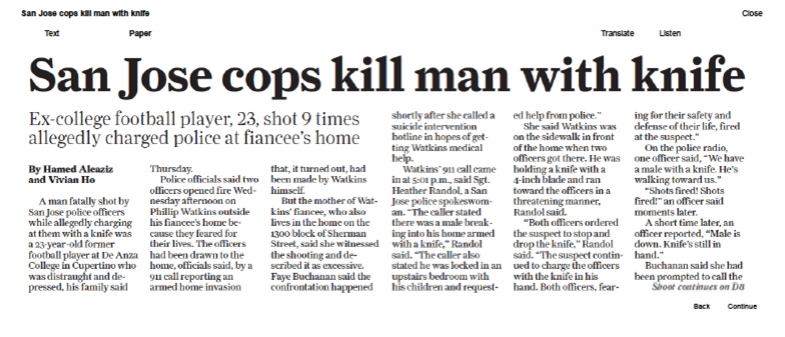PP attachment ambiguity of the week
« previous post | next post »
Is the prepositional phrase attached high, modifying the verb "kill"?

Or is it attached low, to the object NP "man"?

In this case, there is also a difference in the sense of the preposition — instrumental vs. comitative — but often the ambiguity is purely structural, as in these earlier examples:
"Annals of PP attachment", 2/8/2013:
Brennan Objects To Use Of Waterboarding In CIA Confirmation Hearing
"PP attachment is hard", 2/20/2013:
I saw some moms out in Hastings with their kids with tattoos.
"A zero-tolerance approach to PP attachment", 3/26/2014 (OK, this one also involves a functional difference…):
Pope Francis on Saturday appointed a victim of sexual abuse and a senior cardinal known for his zero-tolerance approach to a new group charged with advising the Catholic Church on how to respond to the problem of sexual abuse of children.
"Attachment ambiguity of the day", 1/30/2015:
EU reforms to break up big banks at risk
[h/t Coby Lubliner]

maidhc said,
February 14, 2015 @ 3:53 am
I'm sure that if knife-wielding cops killed someone, you would get a much different headline. So I think the paper made a reasonable choice here. The best alternative version I could come up with is "Man with knife shot by San Jose cops", which is longer by two letters and a space, and misses the point that he was killed ("killed" would add two more letters).
The Brennan one is funny.
John Shutt said,
February 14, 2015 @ 7:29 am
Looking at the subtitle, it's not too troublesome that the police would be at the fiancee's home when they made the claim that the man was shot nine times, but why is it uncertain that they made the claim?
Sandy Nicholson said,
February 14, 2015 @ 7:33 am
Wouldn’t the even shorter ‘San Jose cops kill knifeman’ have done the job? Of course, had the victim been an innocent man who happened to have just bought a cheese knife, it would have been wrong to call him a ‘knifeman’. The other reading is also pragmatically slightly odd, because killings by multiple agents sharing a single knife are, I imagine, rare. In fact, the last time I co-wielded a knife was probably at my wedding (cake-cutting, for the avoidance of doubt).
Victor Mair said,
February 14, 2015 @ 8:04 am
I think that the vast majority of people who encounter this headline would process it the way I did. For a millisecond, I considered the two possibilities, but then virtually instantaneously rejected the police as wielders of the knife since I've never seen American policemen armed with knives. Furthermore, the phrase "with knife" is physically distant from "cops", whereas it's right next to "man" and forms a natural unit with it — "man with knife". So, in about .002 seconds, I interpreted the headline the way the writer intended it.
[(myl) The point is not that people have trouble with such ambiguities, but that parsers do.]
Brett said,
February 14, 2015 @ 10:54 am
@Sandy Nicholson: I think it would be wrong to call him "knifeman" under any circumstances. That's a word I have not encountered in the wild, ever. Google shows that it is out there. However, the first few pages of hits were eall ither references to a British TV show with that name, actually hits for "knife man" or "knife-man", or links to a definition of the word (specifically labelled as appearing only the the unabridged dictionary—not normally available for free online, but apparently on special at the moment, if that makes any sense).
GeorgeW said,
February 14, 2015 @ 10:56 am
By making it passive and adding a two-letter preposition there would not be any ambiguity: 'Man with knife killed by San Jose cops.'
Sandy Nicholson said,
February 14, 2015 @ 11:33 am
@Brett: It might have been ‘wrong’ for the headline-writer in the newspaper in question, as I concede that it may be a BrE term. Looking at dictionaries on my phone, I see that AHD has nothing, while Chambers has ‘knife-man’ and Collins has ‘knifeman’. To me (in Scotland), it seems as unexceptionable as ‘gunman’.
Walter Burley said,
February 14, 2015 @ 1:54 pm
"San Jose cops kill knife-armed man"?
D.O. said,
February 14, 2015 @ 2:08 pm
Another feature which makes it easier-than-usual attachment ambiguity is singular vs. plural. It is not inconceivable for (many) cops to kill somebody with a (single) knife, but not likely.
J.W. Brewer said,
February 14, 2015 @ 2:18 pm
Knife-related violence (perhaps as a side-effect of lower rates of gun ownership?) seems to be more of a thing (possibly in terms of overall statistics and certainly in terms of journalistic salience) in the UK than the US, so it makes sense there would be standardized ways to talk about it that seem odd to the AmEng ear.
Victor Mair said,
February 14, 2015 @ 2:56 pm
For the last few years, I have been tracking knife-related violence in China, and it is huge, from train station knifings where thirty or more people are killed (and lots more wounded), to riots on the street where upwards of hundreds are killed (the Ürümchi riots), to kindergartens and elementary schools where multiple killings take place with disturbing regularity. Killings with guns are unusual in China, though less so now than ten years ago, but people who are intent on committing murder achieve their aims quite effectively with knives.
Extensive data here:
http://crimepreventionresearchcenter.org/2014/04/a-note-on-mass-victim-knife-attacks/
Keith Ivey said,
February 14, 2015 @ 6:47 pm
Some blogs have a running gag of referring to Great Britain as Knifecrime Island. It may have started at The Awl.
===Dan said,
February 15, 2015 @ 7:50 am
About 50 years ago the local paper had a headline "Cop Shoots Man with Knife."
Matt said,
February 15, 2015 @ 7:37 pm
"San Jose cops kill knife-armed man"?
Somewhere J. G. Ballard is taking notes.
Keith Ivey said,
February 16, 2015 @ 9:41 am
Spanish hospitals are more dangerous than I'd have thought: "American Gored by Bull in Spanish ICU".
David J. Littleboy said,
February 16, 2015 @ 10:14 am
Curses on thee, Mr. Ivey: though hast beat me to the punch..
But it realty is a classic.
Yoandri said,
February 18, 2015 @ 11:04 pm
Do all languages suffer from such ambiguities or are there mechanisms whereby some avoid them?